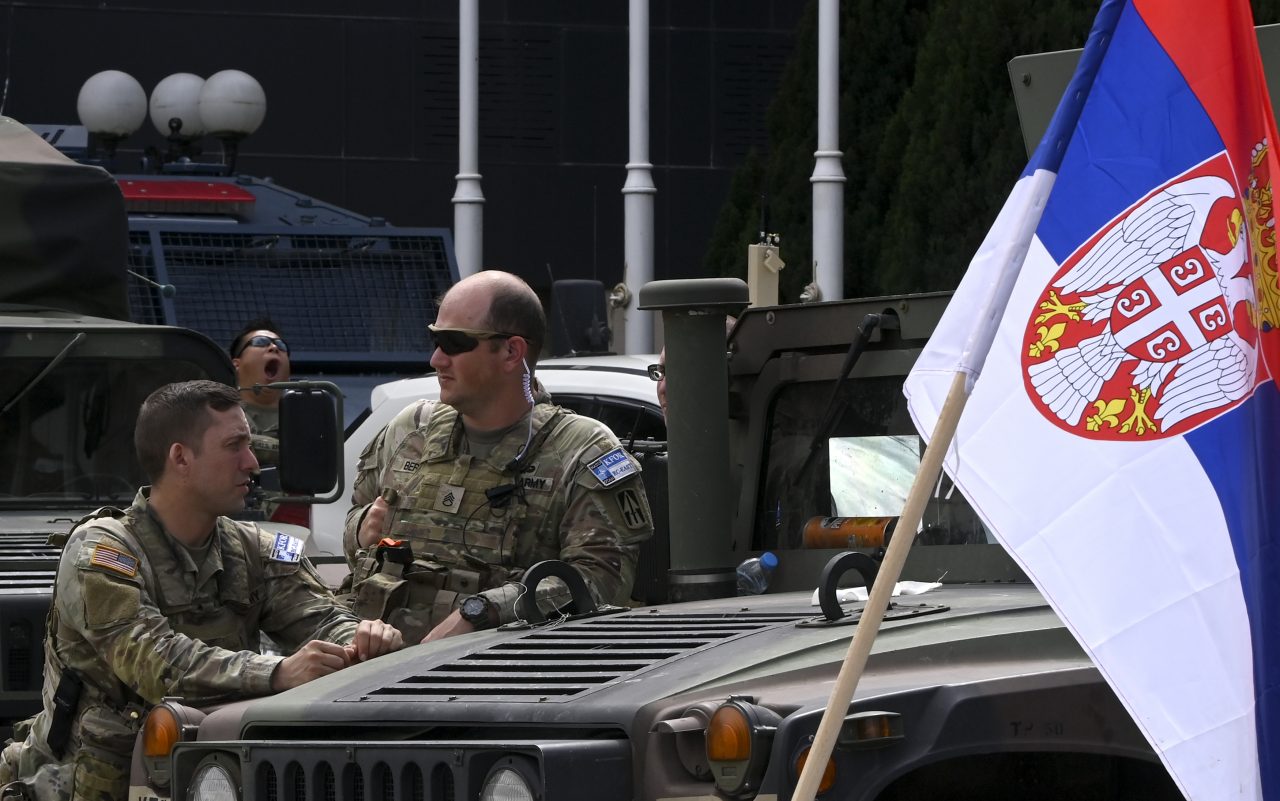

 Soldiers of the US contingent of the NATO-led peacekeeping mission in Kosovo, KFOR, in front of the municipality building in Leposavic, Kosovo, June 2. Photo: EPA-EFE/GEORGI LICOVSKI
Soldiers of the US contingent of the NATO-led peacekeeping mission in Kosovo, KFOR, in front of the municipality building in Leposavic, Kosovo, June 2. Photo: EPA-EFE/GEORGI LICOVSKI
Kosovo must decide soon whether to accept US and EU demands for ‘de-escalation’ measures and new local elections after violent unrest in Serb-majority municipalities or face ‘consequences’ from Washington and Brussels.
Kosovo is facing an impending decision about whether or not to accept US and EU prescriptions for the ‘de-escalation’ of tensions in the Serb-majority north of Kosovo after recent violent unrest, with envoys due to report back to Washington and Brussels with Pristina’s response to their demands by the end of the week.
The requests from Washington and Brussels include holding new local elections with the participation of Kosovo Serbs and the implementation of an agreement that will see the establishment of an association representing Serbs’ interests in northern municipalities.
The demands have been conveyed in person this week during visits by the EU envoy for Kosovo-Serbia dialogue, Miroslav Lajcak, and the US envoy for the Western Balkans, Gabriel Escobar.
Both Escobar and Lajcak have told Kosovo that it faces “consequences” if it does not comply with the US and EU’s requests.
Escobar and Lajcak held high-level meetings in Pristina and Belgrade on Monday and Tuesday as the US and EU sought to impose solutions to stabilise the tense situation that erupted into violence last week when Serbs protesting about the instalment of ethnic Albanian majors in Serb-majority municipalities attacked NATO peacekeeping troops.
Lajcak wrote on Twitter on Wednesday morning after meeting Serbian President Aleksandar Vucic that “violence is never acceptable and a political solution to the current crisis is urgently needed. We appreciated his [Vucic’s] readiness to contribute to it.”
Escobar meanwhile told journalists on Tuesday in Pristina that the March 2023 so-called Ohrid Agreement aimed at normalising relations between Kosovo and Serbia must now be implemented, which “means that we must see real efforts from Kosovo to commit to the Association [of Serb-Majority Municipalities] and we should also see steps from Serbia”.
He insisted that the US stands with the people of Kosovo, but added that it does not support any individual who “does not have an instinct for cooperation” – an apparent reference to Kosovo Prime Minister Albin Kurti, who has strongly defended his government’s actions during the recent crisis.
Escobar also told media in Belgrade on Wednesday that Kosovo and Serbia must return to negotiations in Brussels as part of the EU-mediated dialogue process because “if they turn their back to it, they will turning their back to Europe”.
He added that he hopes the Kosovo government understands that “what we are trying to achieve is a sustainable result and reciprocally beneficial for both countries”.
Kurti wrote on Twitter on Tuesday that he expressed his “unreserved commitment to de-escalation” to Escobar and Lajcak.
“Essential steps forward are an immediate end to attacks on security forces by violent extremists and criminal groups,” he added – a reference to the protesting Serbs who assaulted troops from the NATO peacekeeping mission KFOR in the city of Zvecan on May 29, when 30 soldiers and around 50 protesters were injured.
Kurti added that “a free and fair campaign and elections” are only possible if the rule of law prevails.
Vucic wrote on Instagram meanwhile that “it is time for Pristina to finally meet its commitments, above all, the establishment of a Community of Serb Municipalities”.
Protests against the instalment of the ethnic Albanian mayors of Zubin Potok, Zvecan and Leposavic have continued this week, although not with the same intensity and numbers as before.
The protesters are demanding that the ethnic Albanian mayors elected on April 23 in extraordinary local elections that were boycotted by Serbs do not use municipality buildings, and that Kosovo Police officers leave the area.
The boycott of the elections came after Serbs staged a mass withdrawal from Kosovo institutions. Escobar said on Wednesday that the main obstacle that Serbia faces at the moment is “to convince Serbs to return to [Kosovo’s] institutions”.
Meanwhile the Association of Journalists of Kosovo has registered around 20 cases of attacks against journalists since May 26 when the protests started.
Protesters have thrown rocks and eggs at journalists, pushed them, forced them to delete footage, taken away their cameras and verbally assaulted them. Media crews’ vehicles have been vandalised.
07 June 2023 - 17:00

Kosovo PM Albin Kurti first came to power in a landslide win in 2021, ...

In Kosovo’s public discourse, early pregnancies are frequently portr...

A significant portion of the information consumed by the citizens of K...

Former intelligence agency chief Driton Gashi was sentenced to four ye...